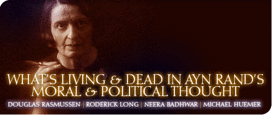I agree with almost everything in Doug’s response to Will’s pot-stirring. (The only real disagreement is over whether respect for rights is merely a background context for flourishing rather than constitutive of it; but we’ve discussed that already.)
Let me just add a couple of points.
I once heard Dave Schmidtz explain moral dualism this way: it may be true that the wise person wouldn’t find murder fulfilling, but what’s wrong with murder is (at least primarily) what it does to the victim rather than what it does to the wise person. So although morality needs a eudaimonic element, it needs to appeal to a different kind of reason as well when it comes to certain aspects of interpersonal morality. (I should add that I don’t mean to suggest that Dave’s entire complex position can be reduced to this one argument! But anyway …)
On Dave’s point about what’s wrong with murder, I agree and disagree. Certainly if one takes what murder does to the murderer as separate from what it does to the victim, then I agree that it would be perverse to hang the wrongness of murder solely or even primarily on the former. But I think that’s the wrong way to conceptualize the eudaimonist approach (and thus the wrong way to conceptualize the eudaimonist strand in Rand’s thought). Rather, what murder does to the victim is constitutive of what it does to the murderer. So we don’t need moral dualism to solve the problem Dave raises, because that problem is the result of excessively dualistic thinking to begin with.
On the coordinating function of morality: my preferred way of handling this is different from Rand’s. I take a unity-of-virtue approach where the value of coordination (which in turn relates to my social-rationality stuff) stands in reciprocal determination with various other values and they’re all thrown into the pot together, so what emerges is guaranteed to include coordinative considerations (along with other considerations that may sometimes trump them). (Note that throwing them all into the pot is crucially different from assigning them to separate spheres à la moral dualism.) But all that involves a dialectical approach to epistemology that Rand rejects. That may explain why Rand (I think) wavers between treating respect for rights as part of the virtuous life and treating it as a background social condition à la Doug’s metanormative framework: if you want coordinative considerations but you’re not willing to throw them into the pot from the start, then you’re going to have to add them on to whatever comes out later.

